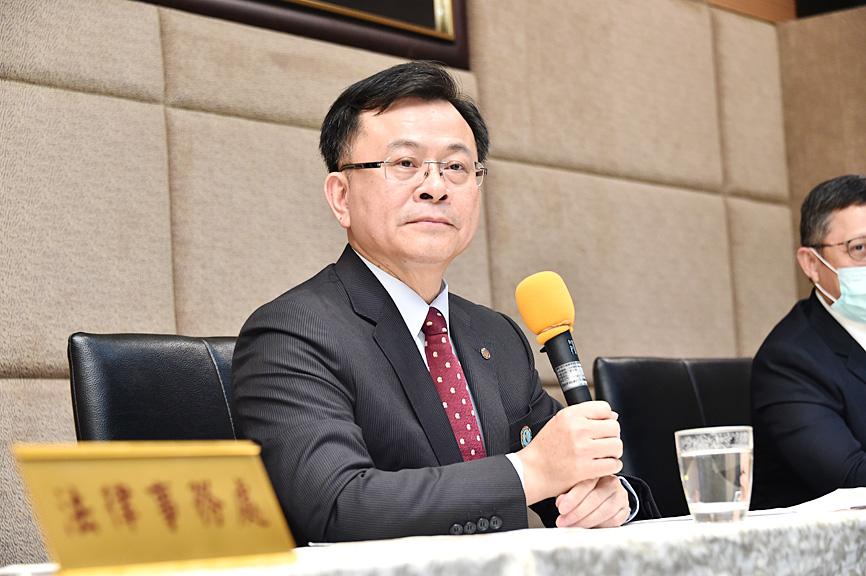National Communications Commission (NCC) commissioners yesterday reached a unanimous decision to reject CTi News’ (中天新聞台) license renewal application on the grounds that the channel’s frequent contraventions of media regulations showed that it has a malfunctioning internal control mechanism that cannot be rectified.
This was the first time since it was established in 2006 that the commission denied a license renewal to a news channel.
NCC Chairman Chen Yaw-shyang (陳耀祥) announced the landmark decision at the commission’s weekly media briefing.

Photo: Tu Chien-jung, Taipei Times
The commission denied the renewal request because the news channel was fined a total of NT$11.53 million (US$400,932) for 25 breaches of media regulations between 2014 and this year — significantly more than other news channels, Chen said.
Last year, the commission received 962 consumer complaints regarding the channel’s broadcasting content, which accounted for about 31 percent of all complaints received that year, he said.
Evidence the commission collected at an administrative hearing on Oct. 26, and a meeting between NCC commissioners and CTi News on Nov. 4 showed that the fundamental problem was that the channel’s largest shareholder, Want Want China Times Media Group (旺旺中時集團) founder Tsai Eng-ming (蔡衍明), had directly and indirectly intervened in the news production process.
The channel’s management said it did not have a full-time managing director in the news department for five months in 2018, and that the post was then assumed by Chiu Chia-yu (邱佳瑜), who was Tsai’s special assistant, Chen said, adding that during this time, the channel’s breaches increased.
During the news conference, Chen was bombarded with questions from reporters, particularly by CTi News journalists.
They asked whether the commission was concerned that its ruling would leave the nation with only one political voice.
“Taiwan has freedom of the press, and it has never been reduced to one voice after it became a real democratic country and entered the digital era,” Chen told them.
Asked if the commission is prepared to engage in a legal battle, Chen said that it respects CTi News’ right to seek redress through the judicial system, adding that it is confident that the review process would hold up to scrutiny.
Reporters Without Borders (RSF) yesterday extended sympathy to the employees of CTi News, but said that it does not believe the decision infringes on freedom of the press.
In a statement released after the NCC’s decision, RSF said freedom of the press does not mean an absence of oversight.
The group also supported the legitimacy of the NCC’s investigation, saying that a periodic licensure review by an independent agency is standard procedure in democracies.
It also called for the same standards to be applied to applications from media outlets of all political stripes.
The government must take responsibility for the nation’s past and current lack of journalistic ethics and editorial autonomy, the group added.
Reporters are working in an extremely polarized and profit-seeking environment, which affects the people’s right to complete and undistorted information, it said.
No matter what party is in power, RSF called on the government to ensure journalistic integrity.
Additional reporting by Kayleigh Madjar

CHAOS: Iranians took to the streets playing celebratory music after reports of Khamenei’s death on Saturday, while mourners also gathered in Tehran yesterday Iranian Supreme Leader Ayatollah Ali Khamenei was killed in a major attack on Iran launched by Israel and the US, throwing the future of the Islamic republic into doubt and raising the risk of regional instability. Iranian state television and the state-run IRNA news agency announced the 86-year-old’s death early yesterday. US President Donald Trump said it gave Iranians their “greatest chance” to “take back” their country. The announcements came after a joint US and Israeli aerial bombardment that targeted Iranian military and governmental sites. Trump said the “heavy and pinpoint bombing” would continue through the week or as long

TRUST: The KMT said it respected the US’ timing and considerations, and hoped it would continue to honor its commitments to helping Taiwan bolster its defenses and deterrence US President Donald Trump is delaying a multibillion-dollar arms sale to Taiwan to ensure his visit to Beijing is successful, a New York Times report said. The weapons sales package has stalled in the US Department of State, the report said, citing US officials it did not identify. The White House has told agencies not to push forward ahead of Trump’s meeting with Chinese President Xi Jinping (習近平), it said. The two last month held a phone call to discuss trade and geopolitical flashpoints ahead of the summit. Xi raised the Taiwan issue and urged the US to handle arms sales to

BIG SPENDERS: Foreign investors bought the most Taiwan equities since 2005, signaling confidence that an AI boom would continue to benefit chipmakers Taiwan Semiconductor Manufacturing Co’s (TSMC, 台積電) market capitalization swelled to US$2 trillion for the first time following a 4.25 percent rally in its American depositary receipts (ADR) overnight, putting the world’s biggest contract chipmaker sixth on the list of the world’s biggest companies by market capitalization, just behind Amazon.com Inc. The site CompaniesMarketcap.com ranked TSMC ahead of Saudi Aramco and Meta Platforms Inc. The Taiwanese company’s ADRs on Tuesday surged to US$385.75 on the New York Stock Exchange, as strong demand for artificial intelligence (AI) applications led to chip supply constraints and boost revenue growth to record-breaking levels. Each TSMC ADR represents

State-run CPC Corp, Taiwan (CPC, 台灣中油) yesterday said that it had confirmed on Saturday night with its liquefied natural gas (LNG) and crude oil suppliers that shipments are proceeding as scheduled and that domestic supplies remain unaffected. The CPC yesterday announced the gasoline and diesel prices will rise by NT$0.2 and NT$0.4 per liter, respectively, starting Monday, citing Middle East tensions and blizzards in the eastern United States. CPC also iterated it has been reducing the proportion of crude oil imports from the Middle East and diversifying its supply sources in the past few years in response to geopolitical risks, expanding